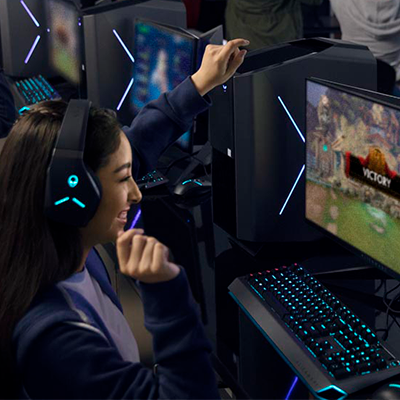When I was a teenager, it might surprise you to learn that sales director didn’t top my list of must-have careers. I wanted to be a DJ when I grew up. My career advisor soon put me right when, having filled in a multiple-paged, multiple-choice questionnaire on my strengths and ambitions, she informed me that I would be more suited to sales than spinning decks. The rest, as they say, is my career history.
Thankfully, today’s schools have much more sophisticated career programmes. Children as young as five are being introduced to different careers, training and skills at school in an effort to inspire them about the world of work. As a result, young learners are more clued up about achieving their aspirations and making the link between what they’re learning in the classroom and the jobs and careers they wish to pursue.
This week, in collaboration with Intel and working with the British Esports Federation, we released a new survey of school students (aged 11 – 17 years) to understand how equipped they feel for higher education and the world of work. When we asked their opinions on the curriculum, teaching and the technology at their disposal, the story was mixed. Many expressed confidence in their teacher’s understanding and use of tech in the classroom, acknowledging the positive impact on their learning. However, only 37% said that tech was up to date and could be said to have a positive impact on their learning. Forty-three per cent also said the current school curriculum is outdated and does not offer them the tools they need to succeed in a modern career.
Once you start to see the connections esports can make across the curriculum, it becomes easier to appreciate why learners value esports beyond the school gates
Unfortunately, these stats are somewhat familiar. In our Future-Proof Research report on Gen Z adults (18-26) earlier this year, over half (52%) of UK respondents reported that school only taught them very basic computing skills. Four in ten (40%) claimed school (under 16) didn’t prepare them with the technology skills needed for their planned career.
The workplace is evolving at breakneck speed, meaning the skills today’s students need to succeed differ from those required ten, five, or even three years ago. Many will find themselves in jobs that don’t even exist yet. Think tanks and government leaders are all considering ways to ensure a skilled pipeline of talent to address the future job market needs, from compulsory maths until age 18, upskilling existing workforces, and encouraging businesses to invest in digital skills. It is no easy task to prepare learners for a future we don’t yet know. So we asked the learners themselves what they felt they needed from their education.
Teaching, teachers and technology must support 21st-century skills
Half (50%) of the UK school students we surveyed said they would like more technology-related subjects added to the school curriculum to improve their career prospects. And our Gen Z respondents said something similar, with a third (35%) suggesting that technology courses at all education levels be made more interesting and widely available.
A lack of skilled tech talent has been an issue for many businesses in recent years, so it is encouraging to hear that children are motivated to engage with more tech subjects. And when it came to what those tech subjects might look like, over half (53%) said that an esports qualification would be as useful to them as traditional subjects such as mathematics. Moreover, 52% stated that studying esports would help them develop the skills required for science, technology, engineering and mathematics subjects.
In essence, school students see the addition of an esports qualification as valuable in and of itself, but they also recognise how it could complement and support traditional STEM subjects. That might seem surprising, even unlikely, to some. But, spend some time watching young people play esports, and it swiftly becomes clear. You’ll witness them test hypotheses, think systematically, analyse data, and employ evidence-based strategies. And that doesn’t even begin to touch the technological proficiency they need to play, film players, edit sound and video, publish tutorials, connect online, and develop programmes.
The Power of Esports as an Alt Route to Higher Ed and Careers
Once you start to see the connections esports can make across the curriculum, it becomes easier to appreciate why learners value esports beyond the school gates, too. Forty-five per cent said that a qualification in esports is relevant to many university courses, and others pointed out that it could help them stand out in the application process. And when we asked students to rate the skills that would give them an edge in a job interview, they called out digital literacy, critical thinking, and communication skills – all skills commonly recognised as necessary for the 21st-century workplace and skills one can learn through esports. Learners clearly see how subjects like esports can help create a pipeline for a skilled future workforce and set up everyone for success.
Passion-led learning
These research findings show that young learners have an appetite and appreciation for esports as part of a new, diverse, future-ready curriculum, and I’m inclined to agree with them. I’ve heard countless examples from my customers on the transformative effect esports in schools can have on their students. And it’s not just because of the potential results of an esports qualification. It’s also because students want to be there. Almost 80% (78%) of those surveyed said they play video games, with many reporting that gaming had spurred new interests and hobbies such as content creation, coding and podcasting. Respondents also emphasised gaining interest in music, history, photography, and art through esports. Esports engages learners; it contextualises their learning and can ignite passions and careers far beyond just gaming.
We need to take the promise of esports in education as seriously as young people do. While some may consider it an unconventional education pathway, young people clearly see the value in esports. It’s why we’re partnering with British Esports Federation – because they, like us, believe that tapping into the opportunity of esports in schools could be the key to igniting the potential in every single learner. And you’d be hard-pressed to find any head teacher in the country who wouldn’t want that for their students.

